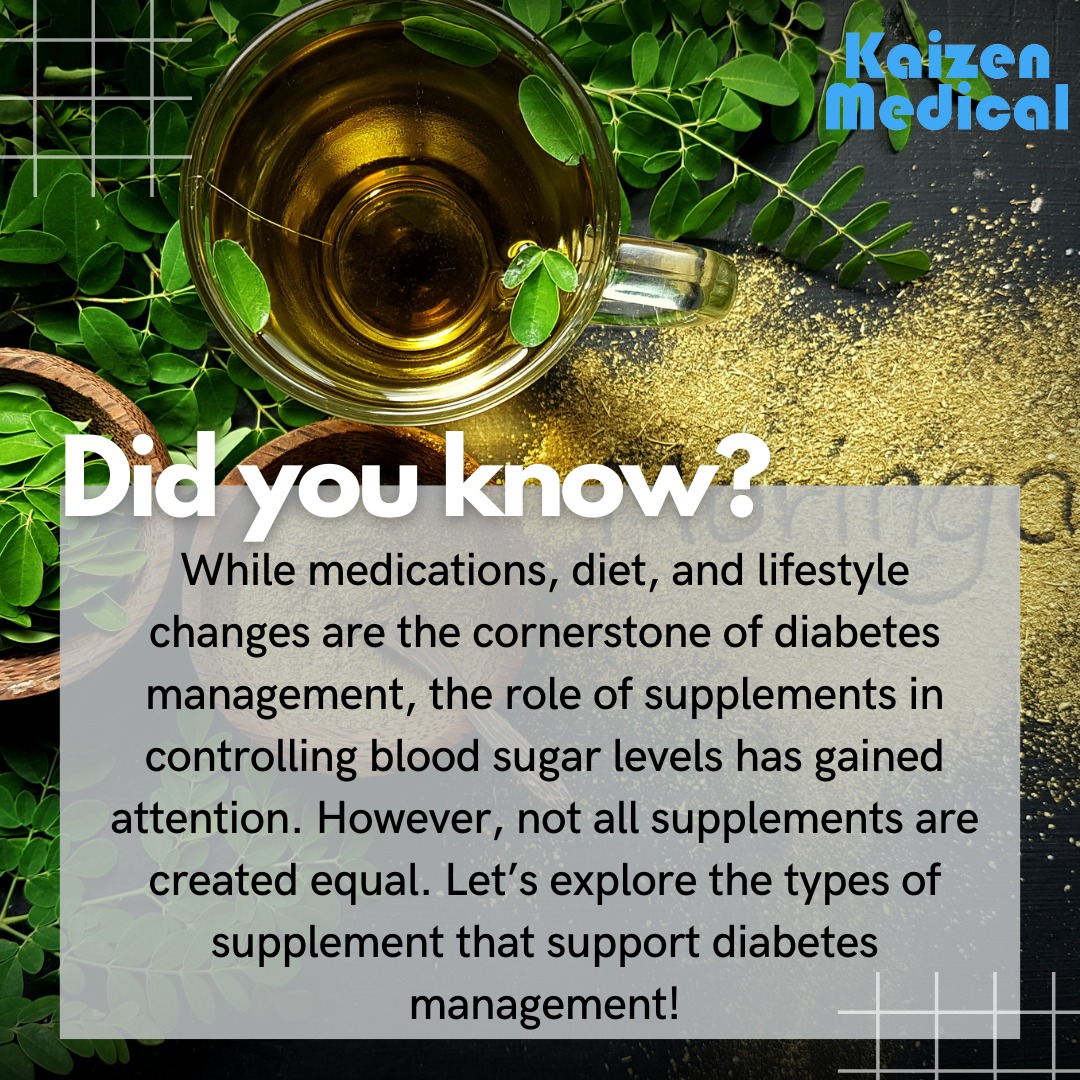Can Supplements Help with High Blood Sugar? Insights from an Internal Medicine Doctor in Singapore
Managing high blood sugar is crucial for individuals with diabetes and those at risk of developing the condition.
While medications, diet, and lifestyle changes are the cornerstone of diabetes management, the role of supplements in controlling blood sugar levels has gained attention.
As an internal medicine doctor in Singapore, I frequently encounter patients curious about whether supplements can aid in managing high blood sugar. This article explores the potential benefits, risks, and important considerations when incorporating supplements into your diabetes care regimen.
Understanding High Blood Sugar and Its Risks
High blood sugar, or hyperglycemia, is a key indicator of diabetes, particularly Type 2 diabetes. It occurs when the body either doesn’t produce enough insulin or becomes resistant to insulin’s effects, leading to elevated glucose levels in the blood. [1]Over time, uncontrolled high blood sugar can lead to serious complications such as cardiovascular disease, kidney failure, nerve damage, and vision problems.
The management of high blood sugar typically involves a combination of medication, dietary adjustments, regular physical activity, and close monitoring of blood glucose levels. However, with the increasing popularity of alternative and complementary therapies, many individuals are exploring the use of supplements to help manage their condition.
Common Supplements for Blood Sugar Management
Several supplements have been studied for their potential to lower blood sugar levels. These include:
- Chromium
Chromium is an essential trace mineral that plays a role in carbohydrate and lipid metabolism. It is naturally present in many foods such as grain products, fruits, vegetables, meat, yeast and more.[2]
The amount of chromium varies based on the condition of the soil and water.
Some studies suggest that chromium supplements, specifically chromium picolinate, may enhance insulin sensitivity and help lower blood sugar levels in individuals with Type 2 diabetes.[3]
However, the evidence is mixed, and not all studies have shown significant benefits. Chromium supplements may also interact with medications, and best to be consumed under the guidance of a healthcare professional.
- Berberine
Berberine is a compound found in several plants, including goldenseal and barberry. It has been shown to lower blood sugar levels by improving insulin sensitivity and reducing glucose production in the liver.
While some studies suggest that berberine may be as effective as certain diabetes medications.[4] It should complement current treatment plans, instead of replacing doctor’s prescribed diabetes medications.
- Alpha-Lipoic Acid (ALA)
Alpha-lipoic acid is an antioxidant that has been studied for its potential to lower blood sugar levels and improve insulin sensitivity. ALA may also help reduce symptoms of diabetic neuropathy, a common complication of diabetes that causes nerve pain and damage. [5]While ALA appears promising, high doses may cause gastrointestinal issues, and its long-term safety is not fully established.
- Magnesium
Magnesium is an essential mineral involved in over 300 biochemical reactions in the body, including glucose metabolism. Low levels of magnesium have been linked to insulin resistance and poor blood sugar control. Supplementing with magnesium may help improve insulin sensitivity and lower fasting blood glucose levels, especially in individuals with magnesium deficiency.
- Moringa leaves
Moringa leaves is sometimes referred to as a superfood. Rich in nutrients such as vitamins A, C and E and quercetin, it helps with reduction of oxidative stress which is typically elevated in diabetic patients.[6] Moringa leaves are easily available and can be incorporated to daily meals by either adding them to soup, or stir frying them. It is advisable to consume moringa leaves in moderation due to its blood sugar lowering properties. When consumed in large quantity, in addition to diabetes medication, it may cause hypoglycemia.
The Role of an Internal Medicine Doctor in Singapore
As an internal medicine doctor in Singapore, I emphasize the importance of individualized care when considering supplements for high blood sugar management. Not all supplements are suitable for everyone, and their effectiveness can vary based on individual health conditions, medications, and lifestyle factors.
Considerations Before Using Supplements
Before adding any supplement to your diabetes management plan, consider the following:
- Consult with a Healthcare Professional
It is essential to discuss any supplement use with your healthcare provider, especially if you are on medication for diabetes or other conditions. An internal medicine doctor in Singapore can help you understand the potential benefits and risks and determine whether a supplement is appropriate for your specific situation.
- Quality and Safety of Supplements
Not all supplements are created equal. The quality, purity, and potency of supplements can vary significantly between brands. It’s important to choose supplements from reputable manufacturers and look for products that have been independently tested for quality and safety.
- Potential Interactions
Supplements can interact with medications and other supplements, leading to adverse effects or reduced efficacy of your diabetes treatment. Always inform your healthcare provider about all the supplements and medications you are taking.
- Monitor Blood Sugar Levels
If you decide to try a supplement for blood sugar control, it’s crucial to closely monitor your blood sugar levels. This will help you and your healthcare provider assess the supplement’s effectiveness and make any necessary adjustments to your treatment plan.
Conclusion
Supplements can offer additional support in managing high blood sugar, but they should not replace conventional treatments such as medication, diet, and exercise. As an internal medicine doctor in Singapore, I recommend approaching supplements with caution and always consulting a healthcare professional before use. Personalized care and a well-rounded approach remain the best strategies for managing diabetes and maintaining optimal health.
By staying informed and working closely with your healthcare team, you can make educated decisions about incorporating supplements into your diabetes management plan, ensuring safe and effective care for your condition.
[1] https://www.ncbi.nlm.nih.gov/books/NBK430900/
[2] https://ods.od.nih.gov/factsheets/Chromium-HealthProfessional/
[3] https://pubmed.ncbi.nlm.nih.gov/15208835/
[4] https://pmc.ncbi.nlm.nih.gov/articles/PMC2410097/
[5] https://pmc.ncbi.nlm.nih.gov/articles/PMC3221300/
[6] https://pmc.ncbi.nlm.nih.gov/articles/PMC6950081/
About Dr Adrian Mondry
Dr Adrian Mondry is a Hypertension Specialist accredited by the German Hypertension League in Singapore. He was previously a senior consultant in the department of medicine at the National University Hospital and Ng Teng Fong General Hospital (NTFGH), Dr Mondry has more than 30 years of experience in the field of internal medicine.
Dr Adrian Mondry is recognised for his leadership and contributions in establishing the dedicated hypertension clinic within the National University Health System and fast-track deep vein thrombosis service at NTFGH.
Dr Adrian Mondry is fluent in English, German and French.
About Kaizen Medical
Kaizen Medical is located at Mount Elizabeth Novena Specialist Centre, Suite 11-57.
At Kaizen, we provide in depth health care to patients with multi-organs diseases; tackling undifferentiated presentations that cannot be easily assigned to a single organ.





